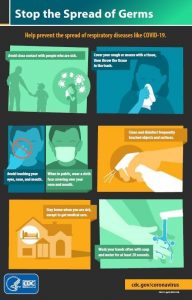https://www.cancer.gov/about-cancer/coronavirus/coronavirus-cancer-patient-information
Courtesy: National Cancer Institute
What is coronavirus, or COVID-19?
Coronaviruses are a large family of viruses that are common in people and many different species of animals. CDC is responding to a pandemic of respiratory disease caused by a novel (new) coronavirus that spreads from person to person. The virus has been named SARS-CoV-2, and the disease it causes has been named coronavirus disease 2019, which is abbreviated COVID-19.
This is a rapidly evolving situation and the risk assessment will be updated as needed.
If I have cancer, am I at higher risk of getting COVID-19?
Because SARS-CoV-2 is a new virus, anyone who is exposed to it is at risk of becoming infected and developing COVID-19.
Some cancer treatments such as chemotherapy can weaken your immune system (cause you to be immunocompromised) and may increase your risk for severe illness from COVID-19.
Other risk factors may also increase your risk for severe illness from COVID-19, including:
- asthma
- lung, heart, liver, or kidney disease
- obesity
- diabetes
- immune deficiencies, including HIV and AIDS
- a history of smoking
- a history of bone marrow or organ transplantation
- prolonged use of corticosteroids or other medications that can weaken the immune system
I am a cancer survivor. Am I at higher risk for severe illness from COVID-19?
People who were treated for cancer in the past may have weakened immune systems, which can increase their risk for severe illness from COVID-19. Cancer survivors may want to discuss their concerns about COVID-19 with their doctors.
If I have cancer now or had it in the past, how can I protect myself?
There is currently no vaccine to prevent COVID-19 or specific treatment for it. The best way to prevent illness is to avoid being exposed to the virus.
The US Centers for Disease Control and Prevention (CDC) recommends the following actions to help people at high risk for developing serious illness from COVID-19 stay healthy:
- Avoid touching your eyes, nose, and mouth
- Wash your hands often with soap and water for at least 20 seconds, especially after going to the bathroom; before eating; after blowing your nose, coughing, or sneezing; and before and after coming in contact with others
- Stay home as much as possible
- Make sure you have access to several weeks of medication and supplies in case you need to stay home for prolonged periods of time
- Clean and disinfect frequently touched surfaces, including doorknobs, light switches, keyboards, countertops, phones, handles, faucets, sinks, and toilets
If you must go out in public:
- Stay at least 6 feet away from other people
- Avoid crowded places
- Wear a cloth face covering; be careful not to touch your eyes, nose, or mouth when removing it; and wash your hands right after removal
NCI provides tips and resources for the cancer community to prepare for any emergency.
What should I do if I have symptoms of an infection?
Call your health care provider if you think you have been exposed to COVID-19 and have symptoms of an infection.
This is a stressful time. How do I cope?
Coping with cancer in the face of the coronavirus can bring up a wide range of feelings you’re not used to dealing with. Learn more about feelings you may have and ways to cope with them.

